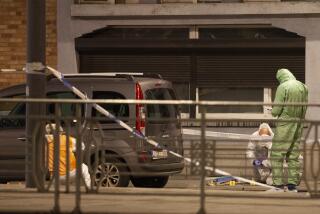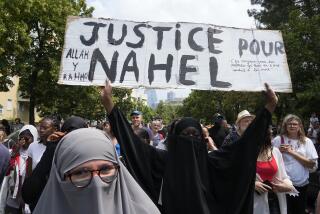Belgium Bickering Over French and Dutch, Its Dual Languages
- Share via
HALLE, Belgium — Leafy Victor Mertens Street hardly looks like a front line, yet it’s on these byways that Belgians are fighting a language battle.
The rivalries that used to erupt in riots in city centers have calmed and moved to the ‘burbs as homeowners flee crowded French-speaking Brussels for a quieter, cheaper life in the Dutch-speaking towns around the capital.
“A little paradise” is how this Flemish town is viewed by Juan Gonzalez, a French speaker from Brussels who moved here a decade ago and sometimes prunes trees with his Dutch-speaking neighbor.
But many people on both sides of Belgium’s language divide have a different view of this new diversity. They are busting for a fight based on electoral laws that have evolved in an effort to cool the bitter, age-old rivalry between this small nation’s two main ethnic groups, Dutch-speaking Flemings and French-speaking Walloons.
The battle over Halle is rooted in one of the great idiosyncrasies of Belgian political life: Most Flemish districts are limited to Dutch-speaking political parties, while Walloon areas generally only have French-speaking parties.
The problem with Halle is that although it is a Flemish town, it falls -- by an arcane political quirk -- into a district where French-speaking parties can appear on the ballot. Flemish parties worry that Halle could give Walloons an opening to gain influence in their region and are appealing to a special political panel to extend the Dutch-only electoral rule to the town.
Belgium tries to ease friction between its two rival regions largely by keeping them apart. Decades of painstaking negotiations have steadily given more autonomy to Flanders in the north, with its 6 million Dutch speakers, and Wallonia in the south, with 3.4 million French speakers. Lying between the two is Brussels, officially bilingual but with a predominantly French-speaking population of 1 million.
Since the 1980s, the country has seen a cooling of anger that often erupted into violence and nearly brought on civil war half a century ago.
But hard feelings are evident. Many people in Flanders, a more conservative, Roman Catholic region, grouse that their wealthier service-based economy subsidizes Wallonia, a socialist coal and steel area whose industries declined after World War II. Walloons depict Flemings as narrow-minded and inward-looking.
The result is an often-divided country, even though both languages are taught in almost all schools. There are no statistics on how many Belgians are bilingual, but the Flemish contend that they do far more to learn to communicate with the other side than French speakers do.
In many Walloon towns and cities, it is nearly impossible to do everyday business speaking Dutch. By contrast, market day next to Halle’s basilica is a medley of Dutch and French as shoppers browse through the stalls. French speakers order endive and sprouts and get the price genially shouted back in French, while Flemings next to them make their purchases in Dutch.
“It is a historical trait,” said Bert Verdickt, a Fleming teacher who sometimes plays tennis with a Francophone neighbor. “At least he makes an effort to learn and speak Dutch. Not many do.”
Communicating at the official level is a different story, however. When French speakers need help at Halle’s City Hall, they have to speak Dutch, a policy imposed by Belgium’s language compromises -- but the clerks sometimes help out in French, even though they’re not supposed to.
Still, language isn’t a hot-button issue for most people these days. “At least we don’t fight anymore,” Verdickt said.
Belgians generally leave the dispute to be played out in politics these days.
And while Belgium’s political parties are linguistically split and mostly stay out of each other’s electoral districts, Flemings and Walloons are far from divorced in the political realm. All major decisions and changes in the constitution must have a majority in each language group, forcing them to work together, however deep the political antagonism.
Flanders has been pitted against Wallonia almost since Belgium was born by splitting off from the Dutch-speaking Netherlands in 1830.
In its early decades, Belgium was a country mostly dominated by French speakers, with a huge Flemish underclass. A Flemish identity movement gained momentum after World War I, and political weight began gradually shifting northward with the waning of Wallonia’s industries and the rise of the Flemish economy.
The regional antagonism reached a crisis after World War II, when Flanders wanted to have King Leopold III return from wartime exile over the objections of Wallonia, which believed that he had been too friendly with the occupying Germans.
Ethnic riots swept the country, including one in which three protesters were shot. Many citizens feared that hatreds were escalating out of control. Then the king abdicated, and tensions cooled.
Street brawls still broke out periodically over language, and Leuven University even split into a Dutch-speaking school and a Francophone campus in 1968, but the violence faded in the ‘70s.
The linguistic bickering gets prominent play in the nation’s media -- and not only in the political pages.
After a loss by Belgium’s national soccer team in mid-December virtually ended its hopes of getting into the 2006 World Cup tournament, French-language newspapers were quick to call for the firing of the team’s Flemish coach. When the coaching situation was reversed in the past, it was Flemish papers that usually were first to call for the coach’s job.
More to Read
Sign up for Essential California
The most important California stories and recommendations in your inbox every morning.
You may occasionally receive promotional content from the Los Angeles Times.










